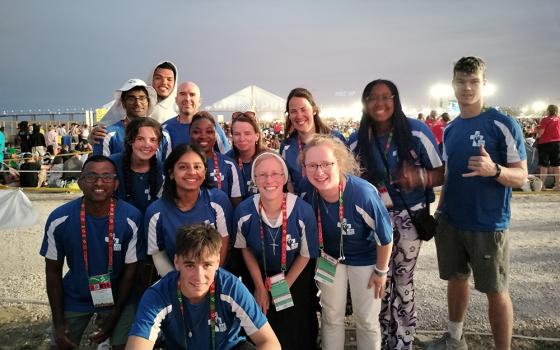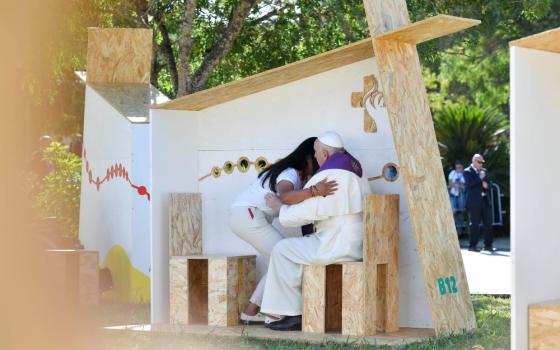Pope Francis meets with about 90 Jesuits at their St. John de Brito College Aug. 5 in Lisbon, Portugal. (CNS/Vatican Media)
Pope Francis blasted what he described as groups of "very strong, reactionary" American Catholics, warning against becoming "backwardists" who oppose change in the Catholic Church.
"The situation in the United States is not easy: There is a very strong, reactionary attitude. It is organized and shapes the way people belong, even emotionally," said the pope. "I want to remind these people that backwardism is useless, and it is necessary to understand that there is a correct evolution in the understanding of questions of faith and morals."
The pope's comments came during an Aug. 5 meeting with the Jesuits in Portugal during his Aug. 2-6 visit to Lisbon for World Youth Day. His remarks were published by the Jesuit journal La Civiltà Cattolica on Aug. 28.
In responding to a question from a Portuguese Jesuit who said he had spent last year in the United States — where he often witnessed criticisms of Francis' leadership of the church, including by American bishops — the pope pointed to what he described as "concrete" examples of church teaching evolving over time.
"Today it is a sin to possess atomic bombs; the death penalty is a sin, it cannot can be practiced, and it was not so before," he said. "As for slavery, some pontiffs before me have tolerated it, but things are different today."
Francis went on to point to the writings of the fifth century monk, Vincent of Lérins, who taught that doctrine "may be consolidated by years, expanded by time, exalted by age."
"Change develops from the root upward, growing with these three criteria," the pope told the Jesuits, noting that Lérins knew that the understanding of the human person is deepened with the passage of time.
"The other sciences and their evolution also help the church in this growth in understanding," Francis said. "The view of church doctrine as a monolith is wrong."
Francis, who regularly hosts private meetings with his fellow Jesuits during his international travels, has often used these encounters to speak candidly about challenges facing the church today.
In 2021, he used a private meeting with Slovakian Jesuits to issue a thinly veiled criticism of the U.S.-based Eternal Word Television Network, known as EWTN, which is frequently hostile to his papacy.
Advertisement
Since the beginning of this pontificate, much of the resistance to the Francis papacy has thrived in the English-speaking world, particularly in the United States, where many of its leaders have openly opposed the pope's pastoral priorities, especially when it comes to welcoming LGBTQ people and other minorities into the church and combating climate change.
While Francis did not name particular individuals or groups in his meeting with the Portuguese Jesuits, he offered a broadside against what he has frequently referred to as "indietrists" (Italian for "backwardists").
"If you don't change upward, you go backward, and then you take on criteria for change different from those that the faith itself gives you to grow and change. And the effects on morality are devastating," said Francis.
"Those American groups of which you speak, so closed, are isolating themselves. And instead of living by doctrine, by the true doctrine that always develops and bears fruit, they live by ideologies," he added. "But when you abandon doctrine in life to replace it with an ideology, you have lost, you have lost as in war."
During his time in Portugal for World Youth Day — a major festival of Catholic young people that takes place every few years in a different city around the globe — the pope repeatedly preached a message that everyone has a home in the Catholic Church.
When asked by a Jesuit who works with university students how this applies to gay students who are not living celibately, but are still active in the church, the pope did not demur.
"The door is open to everyone, everyone has their own space in the church," said Francis. "How will each person live it? We help people live so that they can occupy that place with maturity, and this applies to all kinds of people."
"What I don't like at all, in general, is that we look at the so-called 'sin of the flesh' with a magnifying glass," said Francis. "If you exploited workers, if you lied or cheated, it didn't matter, and instead relevant were the sins below the waist."
"We must not be superficial and naive, forcing people into things and behaviors for which they are not yet mature, or are not capable," Francis said. "To accompany people spiritually and pastorally takes a lot of sensitivity and creativity."
The pope went on to recount his numerous meetings with transgender people, whom he said felt rejected by the church.
"Everyone, everyone, everyone, are called to live in the church," he told the Jesuits. "Never forget that."





